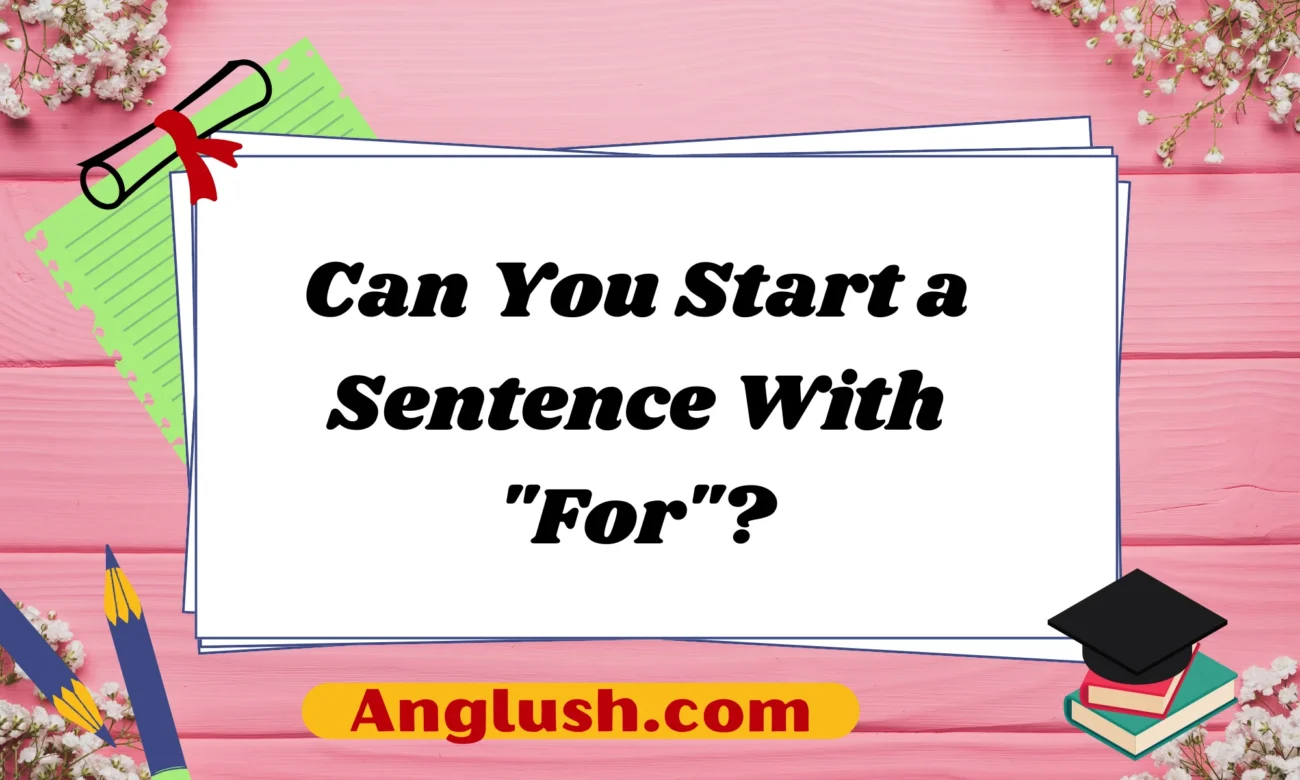Introduction
The English language is full of nuances, and one common question that arises is whether it is appropriate to start a sentence with the word “for.” While some may believe that beginning a sentence with “for” is grammatically incorrect, the reality is that it has been used this way for centuries, particularly in formal and literary writing.
This article will explore when and how you can start a sentence with “for,” the different contexts in which it can be used, and alternative ways to phrase your sentences for clarity and professionalism. Additionally, we will provide 11 user-friendly texting examples that demonstrate various ways to use “for” correctly or replace it with other phrases to maintain a natural flow.
Can You Start a Sentence With “For”?
Yes, you can start a sentence with “for” in certain situations, but it is not as common in everyday speech or modern writing. “For” is a coordinating conjunction, similar to “and,” “but,” and “so.” It often introduces a reason or explanation, much like “because.” However, unlike “because,” “for” is considered more formal and is often found in older or literary texts.
Example Sentences Using “For” at the Beginning
- For the first time in years, she felt truly happy.
- For all his efforts, he still couldn’t complete the project on time.
- For the sake of clarity, let me explain once more.
- For many people, the idea of change is frightening.
- For those who love literature, Shakespeare remains a timeless figure.
While these sentences are grammatically correct, using “for” at the beginning can sometimes make the sentence feel old-fashioned or overly formal. In casual conversation or modern writing, people often prefer other words or sentence structures.
Alternatives to “For” at the Beginning of a Sentence
If you want to avoid starting a sentence with “for,” you can use alternatives that maintain clarity while keeping your writing or speech more natural. Here are some effective replacements:
1. “Because”
Example: Because he was exhausted, he decided to take a break.
- This is the most direct substitute for “for” when giving a reason.
2. “Since”
Example: Since she had already eaten, she skipped dinner.
- “Since” conveys both time and causation, making it a flexible alternative.
3. “As”
Example: As it was getting late, they decided to leave.
- This can sound more natural in spoken English.
4. “Given that”
Example: Given that he had no prior experience, his success was impressive.
- This is useful in formal writing.
5. “Due to”
Example: Due to the heavy rain, the event was postponed.
- This phrase is effective for explaining reasons, especially in professional settings.
6. “Considering”
Example: Considering his background, his performance was outstanding.
- This word adds a thoughtful tone.
7. “In light of”
Example: In light of recent developments, changes will be made to the policy.
- This is often used in business or formal discussions.
8. “With regard to”
Example: With regard to your request, we will provide an update soon.
- A professional way to introduce a topic.
9. “Regarding”
Example: Regarding the issue at hand, we need a quick resolution.
- A direct way to reference a subject.
10. “On account of”
Example: On account of the delay, we have rescheduled the meeting.
- Useful for explaining reasons in formal writing.
11. “As a result of”
Example: As a result of his dedication, he was promoted.
- Ideal for showing cause-and-effect relationships.
Choosing the Right Alternative Based on Context
When deciding whether to use “for” at the beginning of a sentence or opt for an alternative, consider the following factors:
1. Formal vs. Informal Tone
- If you’re writing an academic paper, business report, or professional email, alternatives like “due to,” “in light of,” and “as a result of” are preferable.
- In casual conversations, emails, or texts, using “because,” “since,” or “as” will sound more natural.
2. Sentence Flow
- If “for” makes your sentence sound awkward, consider rewording it.
- Example: For the team’s hard work, they received a bonus.
- Alternative: Because the team worked hard, they received a bonus.
3. Reader Comprehension
- A more common phrase ensures better understanding.
- Example: For her dedication, she was recognized by her manager.
- Alternative: Due to her dedication, she was recognized by her manager.
11 Texting Examples for Everyday Use
Texting often requires a balance between clarity and brevity. Here are 11 user-friendly examples where “for” is replaced with more natural phrases:
- “Because I was late, I missed the meeting.”
- “Since you’re already there, can you save me a seat?”
- “As we discussed, I’ll call you later.”
- “Given that it’s cold outside, bring a jacket.”
- “Due to traffic, I’ll be 10 minutes late.”
- “Considering the price, this is a great deal!”
- “In light of your feedback, I made some changes.”
- “With regard to your question, I’ll find out more.”
- “Regarding our plans, let’s finalize them soon.”
- “On account of the storm, we rescheduled the trip.”
- “As a result of my workout, I feel great today!”
These examples illustrate how simple word choices can improve clarity and make conversations more natural.
Final Thoughts
Starting a sentence with “for” is grammatically correct but is more commonly found in older texts or formal writing. In modern usage, especially in casual or professional settings, replacing “for” with clearer alternatives like “because,” “since,” “due to,” and “in light of” can make your writing sound more natural and engaging.
When writing, always consider the tone, clarity, and audience before choosing whether to use “for” or an alternative phrase. By doing so, you’ll improve both readability and professionalism in your communication.

